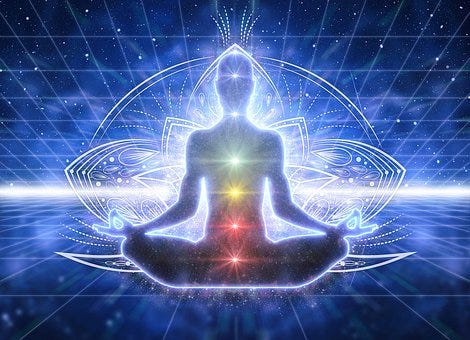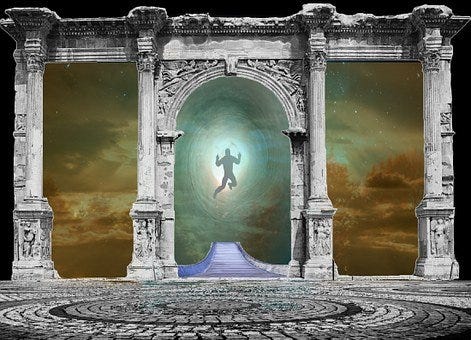
This article is a response to a recent one on Medium.com by Allison J. van Tilborgh, which discussed the absence of the concept of soul in Buddhism. She says that “this is quite a depressing prospect and may even cause a dash of existential dread for some”. I am not one of those. I would always prefer the truth, and would not want to seek false comfort in an illusion, if that is indeed what it is. I do believe in the soul, however, so am here going to argue against this Buddhist way of thinking.
Here is the key statement on which her argument is based: “Buddhism opts for a different view. We are a series of interrelated processes of momentary events (her italics). In no one moment are we the same as the next, so we cannot have just one unchanging soul”.
The italics are presumably intended to emphasise the truth of the statement, but this is not necessarily the truth of how we are; it is only one interpretation of how we are. An alternative interpretation would be that we are individual consciousnesses experiencing a series of interrelated processes of momentary events. It is not necessarily ‘we’ who are changing, rather the contents of our consciousness. These unchanging consciousnesses are what I would call souls, or more accurately, aspects of souls. (Who exactly are the “we” in her final sentence, if we have no real, independent existence?)
The personal psyche is indeed very complicated. Some of these ‘momentary events’ are instincts, emotions, thoughts, intuitions, what Carl Jung called autonomous complexes, what in Roberto Assagioli’s Psychosynthesis are called sub-personalities — the inner child, the inner critic, the rebel, and so on. Consciousness can certainly become immersed in all of these, taken over by them, can identify with them. All this would be impossible, however, if there were no individual consciousness to experience and relate to them.
She continues: “We are continually evolving, and so is the world around us”. Her implication is that because there is constant change, there is therefore nothing permanent. That may be true of the (apparently) material universe, but not necessarily true of the multi-level universe. Theologians sometimes speak of Being (transcendence) and Becoming (immanence). The ‘Becoming’ aspect to which she is referring, the eternal flux, may be only one part of the complete picture. As Shelley said in his poem Adonais: “The One remains, the many change and pass; Heaven’s light forever shines, Earth’s shadows fly; Life, like a dome of many-coloured glass, Stains the white radiance of Eternity”.
She continues: “From a Buddhist perspective, the absence of an innate identity is something to be optimistic about. Even the worst of people, beings, and situations have the opportunity to change for the better”. What exactly does the word ‘opportunity’ mean in this context? Is this going to be merely some random, fortuitous event, or is there some will involved which wants things to change for the better? If so, in the absence of individual souls, does it come from some divine entity? Buddhism does not believe in that, in which case we can only hope for some random movements in the ‘body of the universe’ (her phrase). This may be a forlorn hope. I would suggest, rather, that it is human consciousness which is dissatisfied and wants change, so that it is the presence, not the absence, of an innate identity which gives us reason for optimism.
Ms. van Tilborgh contrasts Buddhist ideas with the Judeo-Christian tradition, and finds them superior. I have no problem with that; Christianity is in need of a major overhaul (a theme I’ve addressed in earlier articles and which I’ll return to soon). Some of the ideas she favours are: the “exchange of self and other”, the “body of the universe”, all beings “are connected to the vast body of life”. These are not exclusive to Buddhism, however, but can be found in other traditions which do include the concept of soul, for example Hinduism, Gnosticism, and Western spiritual traditions alternative to Christianity (e.g. Theosophy), based as they often are on Eastern systems. I agree with all three of her favoured ideas, so they cannot be said to be connected to a belief or non-belief in soul.
Briefly, the foundation of Gnosticism is the idea of a soul trapped within a body, seeking liberation. Western spiritual traditions understand that a soul ‘descends’ into the material world acquiring different ‘bodies’ on its journey (these are responsible for the complexities of the personal psyche described above). One of the foundational statements of Hinduism is “Tat twam asi”¹, roughly translated as “you are the same as the universal essence”. I take the ‘you’ here to be what we in the West call the soul. Why should we believe Buddhism rather than these traditions?

Buddhism believes in reincarnation, so we have to ask, who or what exactly is reincarnating? The following quote comes from an online source: “Reincarnation is the belief the soul cycles in and out of physical bodies. When you die in this life, your soul will return to the earth in another body. This concept is worldwide and ancient. Reincarnation can be found in Hinduism, Buddhism, Sikhism, Jainism, and other far east religions”. This may be simplistic, a false understanding, and I’m happy to concede that Buddhism may have a more subtle and sophisticated knowledge. The onus, however, is on Buddhism to explain this apparent contradiction.
On the subject of meditation, who or what is that ‘I’ which wants to silence the chattering mind, which wants to liberate itself from the personal psyche, to reconnect with the greater universe? Could it really be a non-existent, illusory non-entity?
Ms. van Tilborgh concludes: “The constructed idea of self, in fact, creates an artificial boundary between the sanctity of human life and the sanctity of all other sentient life. It divides where Buddhism unites; life is viewed as a communal gift instead of an individualistic right. It is sanctified in a broad sense, stretching eons and space”. I’m not quite clear what ‘constructed’ means here. I assume she means something like ‘fictitious’, a construct rather than truth. In my view, the boundary between human consciousness and all other sentient life does not arise from a false belief in a soul. It is a result of something called the Transmission Model, following William James. This conceives the brain as a reducing valve which limits consciousness. Believers include:
- Aldous Huxley, author of The Doors of Perception
- famous mythologist Joseph Campbell, saying that “each one of us is potentially Mind at Large”²
- Frederic Myers, a founder of the Society for Psychical Research
- the Cambridge philosopher C. D. Broad
- the French philosopher Henri Bergson, who said: “The function of the brain and nervous system and sense organs is in the main eliminative and not productive. Each person is at each moment capable of remembering all that has ever happened to him and of perceiving everything that is happening everywhere in the universe”³.
A highly relevant book is Beyond Physicalism: Toward Reconciliation of Science and Spirituality⁴, chapter 3 of which is called ‘The “Transmission” Model of Mind and Body: a Brief History’. Its author Michael Grosso says: “What emerges is a picture, deeply embedded in the historical psyche of an intuition of mind as primordial and transcendent, mind interactively interwoven with and essentially pervading physical nature”.
What emerges here is an understanding completely consistent with the Buddhist ideas of which Ms. van Tilborgh approves, but which in no way contradicts belief in the soul. My assumption is that it is the soul which is being limited by the brain. (It can temporarily escape from this bondage through spiritual experiences, ESP, and altered states induced by psychoactive drugs.) It is fitting therefore to conclude with this quote: “The brain is not the mind; it is an organ suitable for connecting a mind to the rest of the universe”. I think Ms. van Tilborgh would agree that this sentence agrees with the Buddhist idea she is expressing. It is interesting, therefore, that I’ve taken this from a book with the title The Spiritual Brain: a Neuroscientist’s Case for the Existence of the Soul⁵.
Buddhism may, of course, be correct in its understanding, but we should certainly not rush to think so. There are other possibilities. According to the Psychosynthesis mantra “I am a centre of pure consciousness, and of will”. Could that be another way of saying the soul?
===================================================================================================
Footnotes:
1. Chandogya Upanishad, VI, viii, 7, as found in Hindu Scriptures, Dominic Goodall, Phoenix Giant, 1996. The full quote is: “This finest essence, — the whole universe has it as its Self: That is the Real: That is the Self: That you are, Svetaketu!”
2. Myths To Live By, Souvenir Press, 1973, reissued 1991, p263
3. quoted in The Doors of Perception, Aldous Huxley, Vintage Classics, 2004, p10
4. Edward Kelly and others, Rowman and Littlefield, 2015
5. Mario Beauregard and Denyse O’Leary, HarperOne, 2007, Introduction, Pxi